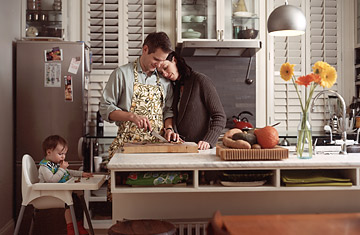
Doug and Naomi Hassebrock of Brooklyn, N.Y. with their baby. Of such quiet moments good health may be made
(2 of 2)
All of this is especially good news for men. A study published in the January 2008 issue of the journal Health Psychology showed that while married men get relief from their workday barrage of stress hormones when they come home after a particularly busy day at work--perhaps benefiting from the same marital proximity the women in the fMRI study enjoyed--working women are able to de-stress similarly only if they describe their marriage as a happy one.
There may be a simple explanation for this. "I'm speculating," says Rena Repetti, a professor of psychology at the University of California, Los Angeles, and one of the authors of the study, "but it may just be that some of these women are coming home and facing dinner prep and assisting the kids with homework, and they're not getting the help that the more maritally satisfied women are getting."
The full explanation for this gender gap, however, is undoubtedly more complicated than that. Long-term data from an Israeli study, for example, indicate that the life-lengthening powers of marriage have increased over time--but again, mostly for men. Over nearly two decades, the study found, married men widened the already significant difference in cancer-death incidence between themselves and unmarried men by 25%; married women gained absolutely zero ground over their unmarried peers. Why this subtle somatic sexism? "This is a gross generalization, but women are really the mental- and physical-health housekeepers for a marriage," says psychologist Janice Kiecolt-Glaser of the Ohio State University College of Medicine. "They are often the ones who prod men to go to a doctor or to eat more healthily."
Miriam Kamin's husband Mark agrees. "As a man, I'm more concerned with making sure the oil has been changed in the last 3,000 miles than with whether I had a physical lately," he says. "Miriam's much more likely to notice something is wrong with me than I am."
When Things Turn Bad
For all its benefits, marriage is not a gift certificate for good health. For one thing, it's fattening. According to a CDC study of health and marriage, married people, while least likely to be physically inactive, are most likely to be overweight or obese. Married men, in particular, seem to pack on the pounds after they say their vows: they are nearly 20% more likely to be overweight or obese than are men who have never married--perhaps because they simply have someone to sit down to dinner with each night or perhaps because the often empty refrigerator of a onetime bachelor fills up fast when someone is making sure to do the shopping.
Data also show that the stress of a bad marriage can undo much of the good that comes with a happy one. In a series of studies, Kiecolt-Glaser and her husband, immunologist Ronald Glaser, also of the Ohio State University College of Medicine, found that "negative marital interactions," such as arguments, name-calling and nonverbal cues like eye-rolling lead to increases in cortisol and decreases in immune function and even wound-healing. The effects were observed in both sexes, but particularly strongly in women. The eye-rolling studies go even deeper than that, with related research conducted by marital expert John Gottman of the Gottman Institute in Seattle revealing just how sensitive spouses are to such nonverbal signs of disdain or dismissal. Coan, who has collaborated with Gottman, says: "How often someone rolls their eyes at you can predict how often you need to go to the doctor."
And when the protective bonds of marriage break, watch out. Those supposedly apocryphal tales of spouses who die within days of each other have more than a little truth to them. A 2007 British study found that at any given moment, a bereaved spouse has a greater risk of death from just about any cause (except, oddly, lung cancer) than a still married person. "Over time," says Coan, "your brain becomes used to the other person as part of your emotional-regulation strategy. You take that person away, and you become what we dryly call dysregulated--weepy, mournful, stay up half the night. This can come from death, divorce, even a long business trip. When those bonds break, it can cause a lot of pain and emotional suffering."
Certainly not all suddenly single spouses are fated to languish this way--no more than all people who never pair off are destined for a shortened life filled with illness and stress. Humans are socially resourceful creatures who build and rebuild networks of relationships, getting the attention, hand-holding and even scolding they need in a lot of different ways. Still, it's hard to argue with an institution that keeps a companion and caretaker constantly nearby, even if now and again--when a wet towel has once again been dropped on the floor or a tube of toothpaste has been squeezed all wrong--we may lose sight of that happy fact.
